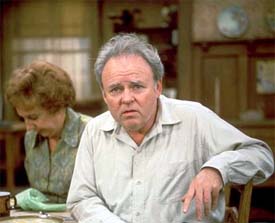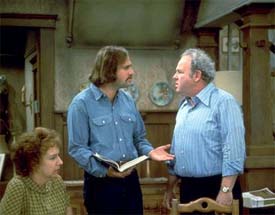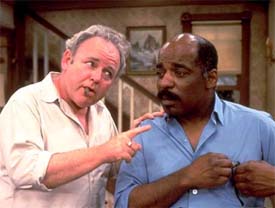
|
Media Matters
For me, as a scholar of the media with a strong historical bent, the debate has prompted me to revisit some of the early depictions of gays on television. In particular, I recently tracked down a copy of what scholars have documented to be the first positive portrayal of a gay issue on American television.
The program was All in the Family, and the date was February 9, 1971-barely a month after the innovative sitcom had gone on the air. In the opening scene of the episode, Archie Bunker learns that a friend of his long-haired son-in-law, Mike, is coming to the house for lunch. Archie has met the friend before, and, as soon as his name- Roger-is mentioned, the bigoted head of the household lets loose with a string of disparaging comments. Archie calls Mike's friend "a fairy," "a fag," and "as queer as a four dollar bill." Archie's saintly wife Edith and liberal daughter Gloria try to defend Roger, but the head of the household will have none of it, responding, "We run a decent house here, and we don't need any strange little birdies flying in and out." When Roger appears-with a scarf fluttering around his neck and using words such as "fabulous" and "enchanting"-Archie makes a beeline for the door. The next scene shows Archie joking and kidding around with his pals at Kelcy's, the neighborhood bar. Prominent among the drinking buddies is Steve, a tall and ruggedly handsome man with broad shoulders, a muscular build, and a deep voice. Archie clearly idolizes the former professional football player, buying him beers and repeatedly slapping him on the arm and shoulder.
Kelcy pulls Mike aside and quietly asks, "This kid you come in with, is he straight?" Mike says, "Of course he is. Why?" Kelcy then explains that he doesn't want his business to become known as a gay bar. "Now, don't get me wrong," he assures Mike. "I don't mind Steve. He only comes in for a drink once in awhile on his way home. Besides, he doesn't 'camp it up,' you know, and he don't bring in none of his friends." Mike looks confused. "Kelcy," he asks, "are you trying to tell me Steve is . . . ?" Kelcy nods his head and says, "I just wouldn't want my place to become no hangout." The next scene shifts back to the Bunker living room when Archie returns home to find that Roger has not left yet. Archie makes several more derogatory remarks, including referring to Mike's friend as "Roger Bell." The son-in-law becomes angry and, once the guest is gone, says, "Listen, Arch, you make one more crack about my friend Roger and . . ." Mike stops before finishing the sentence but then adds, "Never mind, but I could tell you somethin' that could shock you pretty good." Archie takes the dare. "Listen, sonny boy, I been everywhere where the grass grows greener. Ain't nothin' you gonna show me or tell me that's gonna shock me." With that comment, Mike loses his temper and blurts out that Steve is gay. "That's right, Arch," he says. "I wasn't gonna say anything, but it's true." Archie refuses to believe it. "You're sick, you know that!" he yells at Mike. "You need help!" Archie then returns to the bar where Steve and his other pals are watching a boxing match on TV. Mike's comment is still lingering in Archie's mind as he challenges Steve to an arm-wrestling match. Once the beefy ex-football player wins, Archie is reassured, shaking his head and saying, "When I think of what that dopey son-in-law of mine said." Steve responds, "Mike still bugging you?" "It's not only him," Archie says. "It's his whole generation. I mean, they got no respect for the old institutions." "What institutions, Archie?" Steve asks. "Well, you know," Archie begins. "Sports, sportsmanship, guts, guns-the things that separate the sexes." Archie then makes a disparaging remark about Roger, calling him a "la-de-da," and then tries to tell Steve what Mike said.
Steve smiles, looks Archie directly in the eye, and says, "How long have you known me-ten or twelve years? In all that time, did I ever mention a woman?" Clearly uncomfortable, Archie says, "You're a bachelor. Bachelors are always kinda private actin'." "Exactly," Steve says. Archie is still incredulous. "Have it your way, Arch," Steve says, still smiling. The gay ex-professional football player then gives his buddy a friendly punch on the shoulder and walks out of the bar, leaving Archie with a bewildered look on his face. The episode's sensitive handling of a gay-themed storyline, when previous depictions of homosexuals had consistently been negative, sent an important message: Gay men vary widely in their appearance, their values, and their lifestyles. Scholars who have studied the evolution of how the media have depicted gay people have pointed to that episode of All in the Familyas the first instance in which a network television program aired a positive plotline involving a gay issue. According to scholar Larry Gross, in his book Up from Invisibility: Lesbians, Gay Men, and the Media in America, the episode also opened the door for other programs such as Soap, later in the 1970s, and Dynasty, in the 1980s, that included recurring gay characters in their casts. And Gross further observes that this progress ultimately laid the groundwork for the programs with gay characters-some of them in leading roles-that are appearing on the small screen today. Nor was the episode with Steve the last time that All in the Family would cross a new threshold vis-à-vis sexual orientation. One later storyline revolved around the Bunkers attending the funeral of Edith's cousin, Liz, and learning that she had been a lesbian and that she had left her estate to her female life partner. And another one involved Archie giving mouth-to-mouth resuscitation to a woman but later discovering that she, though dressed in women's clothing, was-at least anatomically-a he. Regardless of whether a person thinks that Jack of Will & Grace is or is not too campy or that Willow of Buffy the Vampire Slayer is or is not too evil, there can be no doubt that we all owe a permanent debt-and a sizable one-to All in the Family.  Rodger Streitmatter, Ph.D. is a member of the School of Communication faculty at American University in Washington, D.C. His latest book, Voices of Revolution: The Dissident Press in America has recently been published by Columbia University Press. He is also the author of Unspeakable: The Rise of the Gay & Lesbian Press in America (Faber & Faber, 1995) and Raising Her Voice: African American Women Journalists Who Changed History (The University Press of Kentucky, 1994)
Rodger Streitmatter, Ph.D. is a member of the School of Communication faculty at American University in Washington, D.C. His latest book, Voices of Revolution: The Dissident Press in America has recently been published by Columbia University Press. He is also the author of Unspeakable: The Rise of the Gay & Lesbian Press in America (Faber & Faber, 1995) and Raising Her Voice: African American Women Journalists Who Changed History (The University Press of Kentucky, 1994)
|
|
 Archie has trouble dealing with Edith on All in the Family, which is still seen in re-runs on TV Land
Archie has trouble dealing with Edith on All in the Family, which is still seen in re-runs on TV Land Archie disagrees with his son-in-law, Mike (a.k.a. Meathead)
Archie disagrees with his son-in-law, Mike (a.k.a. Meathead)  In addition to addressing gay-rights issues, All in the Family took on racial prejudice as well
In addition to addressing gay-rights issues, All in the Family took on racial prejudice as well